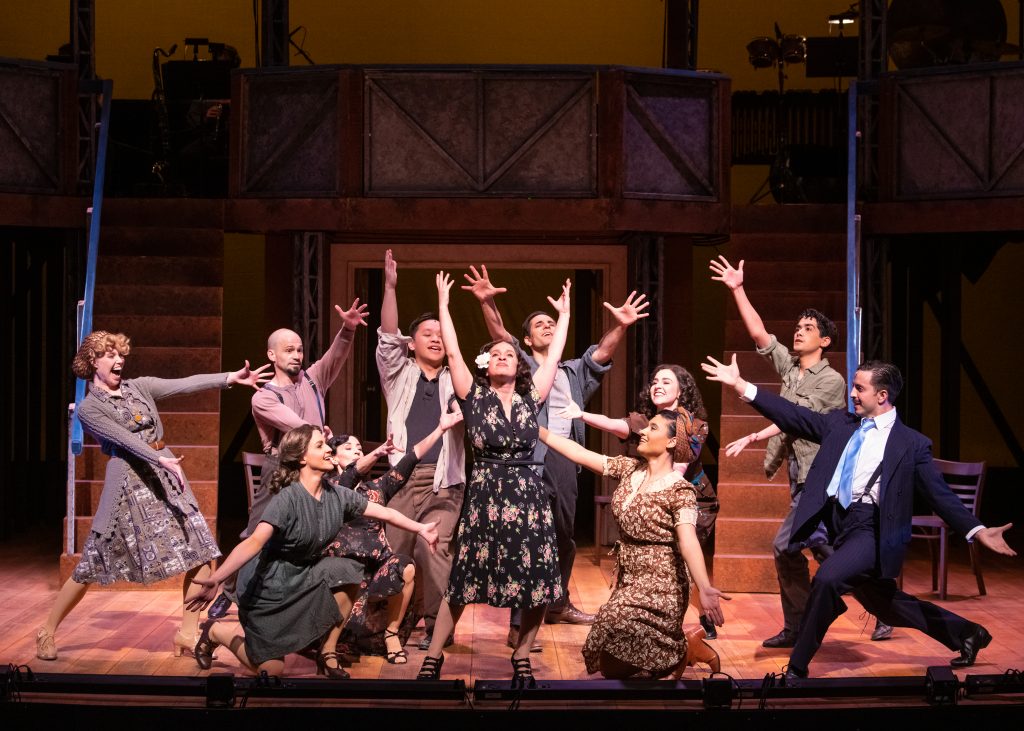‘Evita’ Boasts Strong Singing, Dancing
Skylight's staging may lack enough quieter moments, but has plenty of vocal power.

Rána Roman (center, floral dress) and the cast of Skylight Music Theatre’s production of Evita. Photo by Mark Frohna.
Argentine-born Gustavo Zajac points out in interviews that Peronista fever is still so volatile in his homeland that the famous Andrew Lloyd Webber and Tim Rice musical Evita – which began as a British rock album and then took over Broadway in 1980 – still cannot be done there without causing riots.
As director and particularly as choreographer of a new Skylight Music Theatre production of the show, Zajac has created the most impressive, crispest musical ensemble the Skylight has had in my memory, adding meaningful tango dancing and important movement thrusts to the staging, running through Feb. 19 at the Cabot Theatre.
Expert tango dancers Guillermina Quiroga and Mariano Logiudice – What nimble steps! What extensions! — are also inserted seamlessly into the active ensemble, most of whom are newcomers to the Skylight. That means constant motion and singing as they pretend to be various crowds and players, while Broadway coordination, twitching bodies, sumptuous lifts and Argentine flavors suggest a vision of the times (1940s on) that outdo the Broadway original and at least physically return Evita to the more meaningful social commentary the authors may have intended and so few revivals understand.
Some elements of the story have been cleverly changed as Eva Duarte moves from club hanger-on to sexual climber to patron of the poor, a growing authority within her that almost inevitably hooks up with Colonel (soon general) Juan Peron to rule Argentina, becoming the new Virgin Mary to the disadvantaged, calculated in intent but beloved by the crowds.
While seeking status as the spirit saint of the country, Eva Peron also tried to become a clotheshorse to the world, which allows some fabulous work by costume designer Kristina Sneshkoff, with an amazing flock of wigs credited to David Roman.
Some meaningful balcony rail flaps seemed messed up opening night, but the scenic design by Erik D. Diaz is otherwise solid. So were the panels of hidden lighting by Latrice Lovett.
I thought the director’s efforts to find higher ground for Rana Roman on chairs and suitcases drew attention to her smaller size in the cast — and her performance didn’t need that sort of help.
As Evita, the actress unleashes both vocal power and nuance – and she makes Evita seem 10 feet tall in her balcony control over the crowd. Her ability to fill large spaces with strong singing and then subdue her voice into quiet injury for the thoughtful moments — all are musical factors the role needs and often doesn’t get, so blinded are performers by the showoff primping and those surges of vocal dominance manufactured by the composer.
Roman may merely touch Evita’s sexual allure in the early going. Instead, she focuses on that strength of will, her passion for her cause and her vehemence about being underestimated. That makes for a more interesting story progression and thoughtful (not just belting) vocalizing.
These elements of the production are good news, but there is also a price being paid. It became most visible in the drawn-out conclusion where the sad history of the Perons and Argentina are projected onstage even as a dirge sounds for her death in her thirties from cervical cancer.
Whatever the failures of the original creators, Webber did provide some forward-moving story tunes (“I’d Be Surprisingly Good for You,” “High Flying, Adored”) beyond his most famous melody – “Don’t Cry for Me Argentina,” whose melodic line he inserts in many guises while also power-chording his way through crowd scenes.
But while the music is being given space to breathe, there was some strength missing in handling Rice’s lyrics. Granted they are uneven but they contain ironies and contrasts that Zajac certainly understands in his physical directorial touches. The phrasing becomes a bit lost in the desire for the big overpowering sound (which is something patrons think they want and this cast has in abundance).
Which brings me to a performer I wanted to admire – and he has the biggest role in the show: Richard Bermudez as Che. He looks the lean and angry part, like a truth teller emerging from the streets of Buenos Aires to comment on Eva’s eerie magnetism over the masses.
In 1980, the vision of Che was still tied to terrorist Che Guevara, and the original Broadway Che, Mandy Patinkin, had to dress like a guerrilla and look the image. Here Zajac makes it plain through street dress and mocking manner that Che is the skeptical ordinary guy whose tenor should stand in contrast to Eva’s formidable lung power.
Bermudez displays a commanding vocal range in the role, with an ability to tone down the volume and stretch out the meanings — if asked. He’s not being asked enough, as if in fear that the audience would not know how to appreciate the space between tonal blasts. He makes the sardonic nature of the role come down to the physical acting and not Rice’s probing lyrics.
Another problem touches a formidable performer, Andrew Varela, who portrays Peron as a grinning crowd-pleasing oaf, looking like the actual Peron in bulk and smile, only displaying his personal power in choreographed tests of strength with military challengers. The problem is the performer wants to do more with the part, and we do, too. Varela is punching his way through while we are longing for an intimate duet with him and Evita, to bring out something truer in their relationship. It was an opportunity Webber and Rice missed but the actor and director clearly wanted. It’s a reminder of how each generation seeks to reshape a famous musical.
There are some catching moments from others. Christian Feliciano plays Magaldi, openly mocked in the script as a talentless nightclub singer, yet Feliciano brings the house down twice by good singing and movement. Young performers Lucia Harris and Emily Honigman give a lullaby-ish ode to Evita (“Santa Evita”), a quiet moment that conveys how much her madonna act has taken the Argentine public in. All the ensemble deserves honorable mention.
Keyboardist David Bonofiglio heads a nine-piece band occasionally visible at the back of the stage balcony, showing perhaps too much care in letting the performers dominate the power moments.
Dominique Paul Noth served for decades as film and drama critic, later senior editor for features at the Milwaukee Journal. You’ll find his blogs here and here.
Theater
-
‘The Treasurer’ a Darkly Funny Family Play
 Apr 29th, 2024 by Dominique Paul Noth
Apr 29th, 2024 by Dominique Paul Noth
-
Rep’s Nina Simone Play a Puzzle
 Apr 23rd, 2024 by Dominique Paul Noth
Apr 23rd, 2024 by Dominique Paul Noth
-
Skylight’s ‘Eternity’ Is a Slam Bang Show
 Apr 15th, 2024 by Dominique Paul Noth
Apr 15th, 2024 by Dominique Paul Noth




















